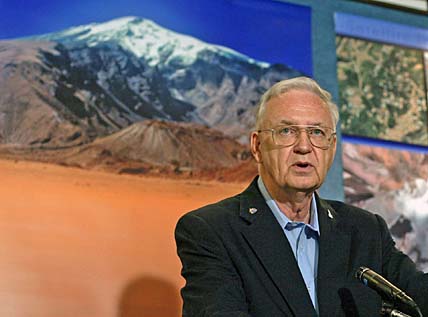— ADVERTISEMENT —

Turkey denies Honolulu
man’s bid to find Ark
The government cites security
concerns in refusing the quest
A Honolulu businessman's plan to take an expedition to Mount Ararat in search of Noah's Ark ended this week when the Turkish government refused to permit it because of security concerns about the area, which borders Iran and is 150 miles from Iraq.
Daniel McGivern, president of Shamrock-The Trinity Corp., was notified Wednesday that the search won't get off the ground. An official at the Turkish Embassy in Washington, D.C., wrote that his application to do research on the mountain "was declined by the relevant Turkish authorities due to the security restrictions."
The consular official did not detail specific security concerns, but Turkey has experienced terrorist incidents.
"It's their country, and the decision is up to them," McGivern said yesterday. He said he has spent $160,000 on the project, beginning with commissioning satellite photography of the 17,000-foot mountain by three companies since 1997.
McGivern displayed 2003 satellite pictures at an April 26 press conference at the National Press Club in Washington, D.C. He said the images of apparent man-made structures were visible at the 15,500-foot level, revealed because part of the Ararat ice cap melted in Europe's heat wave last summer.

|
McGivern planned an exploration to be led by Ahmet Ali Arslan, a Turkish university professor with 40 years' experience as a climber, and to include archeologists, geologists, forensic scientists and a film crew who would investigate and photograph the structures.
The plan was to start the expedition on July 15. As the summer wore on without government approval, McGivern continued to hold out hope, knowing the opportunity would be gone at the end of September when winter storms begin.
He said yesterday he learned that the Russian government also applied for a permit to explore the site and did not receive it. He heard of several other groups that jumped on the bandwagon after he revealed the pictures taken by DigitalGlobe, a commercial satellite imagery company, but none received Turkish permits.
McGivern said "This was the year," and he will not pursue the dream again. "I don't have Ark fever like many who go year after year.
"A good businessman calculates what amount of money and time he will invest and has to know when to walk away," he said last month. "Of course, Noah's Ark is totally different, way beyond business for me. Christians, Jews and Muslims believe in it. It will confirm the faith of millions ... and many will be brought to faith. It will change how scientists look at the world."
Active in Catholic lay groups, McGivern, 64, is best known here as president of Pro Family Hawaii, lobbying most recently against physician-assisted suicide legislation.
The story of Noah's Ark appears in the Book of Genesis, in which God saw how corrupt humans had become and sent rains to destroy the earth by flood. The account details the dimensions of the pitch-covered boat in which God allowed Noah, a righteous man, his family and a selection of living species to escape destruction. In the account, the ark came to rest "in the mountains of Ararat."
— ADVERTISEMENTS —
— ADVERTISEMENTS —